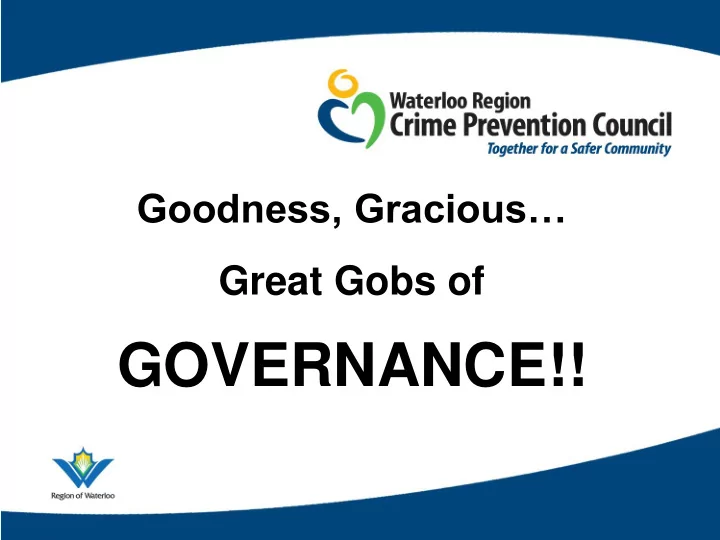

Goodness, Gracious… Great Gobs of GOVERNANCE!!
Policy Governance Policy Governance -- informally known as the Carver model -- is a system for organizational governance. Policy Governance defines and guides appropriate relationships between an organization's owners, its board of directors, and its chief executive through the use of formal Policies and Executive Limitations.
Governing Style Policy “ The Council will approach its task in a style, which emphasizes outward vision (rather than internal pre- occupation). The Council encourages diversity in viewpoints, strives to provide strategic leadership, clearly distinguishes the Council and staff roles, and actively displays an orientation toward the future rather than the past or present. The Council’s overall orientation is pro-active and the Council strives to maintain that approach even in reacting to current crime prevention issues”. P 14
Council Relationship Policy “ The Executive Director is responsible for the operations of the organization delivered through staff, and for supporting the work of the Council’s Committees (within available resources). The Executive Director is accountable to the Council for the discharge of their responsibilities ”. P 31 “ The Executive Director takes their directions from the Council and individuals or committees who have been charged by Council with specific authorities”. P 31
Executive Limitations Executive Limitation Policies use phrases such as “may not,” “must not” and “shall not.” This language is chosen to set clear parameters to the actions of staff and volunteers and is not intended to reflect negativity. General Executive Limitation The actions taken by the Executive Director must not run counter to a Council policy or policy direction provided by Council motion. If the actions are compliant, the Executive Director is free to take action as they deem appropriate.
Being an Effective WRCPC Member Attendance : Members are expected to miss no more than three (3) meetings per year and no more than two (2) consecutive meetings per year. Members should request a leave of absence when business or personal demands will prevent the above. Council members will be expected to make their regrets no later than 12 noon of the day prior to the meeting.
Being an Effective WRCPC Member Support for Decisions of the Council : The Council speaks with one voice. When a member has a dissenting opinion, the member should state Council’s position on the issue and re-direct inquiries to the Chair or Executive Director. Should a member find themselves with a dissenting opinion that cannot be resolved, they have the option of resigning from the Council.
Being an Effective WRCPC Member Sector Representatives: The Sector Rep does not represent an agency as much as an area of expertise and community involvement. Sector Reps will connect with others in their sector to ensure optimum participation as per strategic plan. There may be persons/organizations/groups that have previously not engaged with the Sector Reps but that could benefit from being included. It is the Sector Rep’s role to seek out members of their sector and seek their involvement in crime prevention through social and community development.
Being an Effective WRCPC Member Ex-officio Member: The Ex-officio members are members of Council by merit of their position or the office they hold in the community. Ex-officio are the heads of legally mandated orgs that impact crime prevention through social and community development. Recognizing ex- officio members can’t reasonably be expected to attend all meetings, they can delegate their attendance to an alternate senior staff member of their org (who is approved by the nominating committee). Ex-officio members & alternates have voting rights. Should both the ex-officio and designate be in attendance, they have one vote between them.
Recommend
More recommend